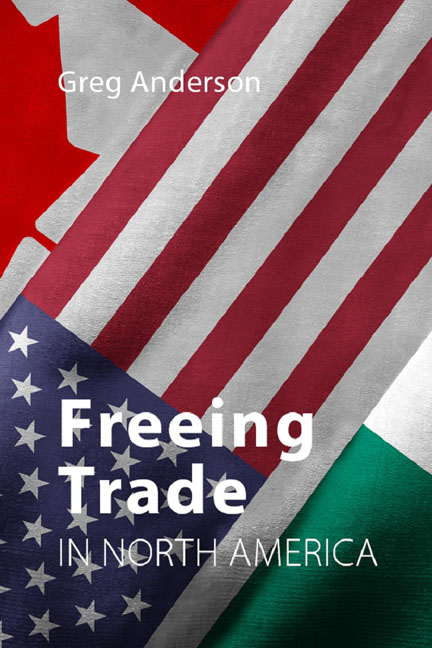Book contents
- Frontmatter
- Contents
- Introduction
- 1 The North American Idea
- 2 What the NAFTA is (and is not)
- 3 North America as Region
- 4 New Ground Broken and (Mixed?) Results
- 5 Much ado about Foreign Direct Investment
- 6 Governance in the NAFTA, or Lack Thereof?
- 7 Labour and the Environment
- 8 NAFTA 2.0: Did the Usmca Modernize Anything?
- Appendix 1 Spaghetti Bowl of Commitments by the 12 Trans-Pacific Partnership Signatories
- Appendix 2 US Trade in Goods and Services With NAFTA Partners, 1989–2017
- References
- Index
Introduction
Published online by Cambridge University Press: 24 August 2023
- Frontmatter
- Contents
- Introduction
- 1 The North American Idea
- 2 What the NAFTA is (and is not)
- 3 North America as Region
- 4 New Ground Broken and (Mixed?) Results
- 5 Much ado about Foreign Direct Investment
- 6 Governance in the NAFTA, or Lack Thereof?
- 7 Labour and the Environment
- 8 NAFTA 2.0: Did the Usmca Modernize Anything?
- Appendix 1 Spaghetti Bowl of Commitments by the 12 Trans-Pacific Partnership Signatories
- Appendix 2 US Trade in Goods and Services With NAFTA Partners, 1989–2017
- References
- Index
Summary
Turtle Island
My exposure to the politics of international trade began in the mid-1980s, when Canadians were thrust into an existential debate among themselves over the future of their economic relationship with the United States. The catalyst was a proposed comprehensive free trade agreement between the two countries. Americans hardly batted an eyelash at the negotiations, but they transformed Canada’s 1988 federal election campaign into a single-issue referendum on the future of the country. Just a few years later Americans and Mexicans confronted similar angst as all three North American states debated whether to support the North American Free Trade Agreement (NAFTA).
To students of North American integration, the bruising political debates that preceded the NAFTA’s eventual implementation in 1994 can myopically appear to have been one of the most important events in the history of North America: time before NAFTA and then NAFTA. The NAFTA era was unquestionably a significant development in the political economy of postwar North America.
Yet it was hardly the first time anyone has thought about what North America is and what it ought to be.
When Christopher Columbus “discovered” the Americas in 1492, he quickly learned a lot of people had already discovered it. Indeed, by some estimates, there were as many as 100 million people spread throughout the Western Hemisphere at the time, many of them descendants of Asian migrants from a much earlier period (see C. Mann 2005; Jennings 1975).
The 1975 Pulitzer Prize for Poetry was awarded to University of California–Davis professor and poet Gary Snyder for his collection of poems entitled Turtle Island. It was a name given to what we now refer to as North America by aboriginal communities and derived from the creation myths common to many of them.
Snyder writes:
Turtle Island – the old/new name for the continent, based on many creation myths of the people who have been living here for millennia, and reapplied by some of them to “North America” in recent years. Also, an idea found worldwide, of the earth, or cosmos even, sustained by a great turtle or serpent-of-eternity.
- Type
- Chapter
- Information
- Freeing Trade in North America , pp. 1 - 6Publisher: Agenda PublishingPrint publication year: 2019



